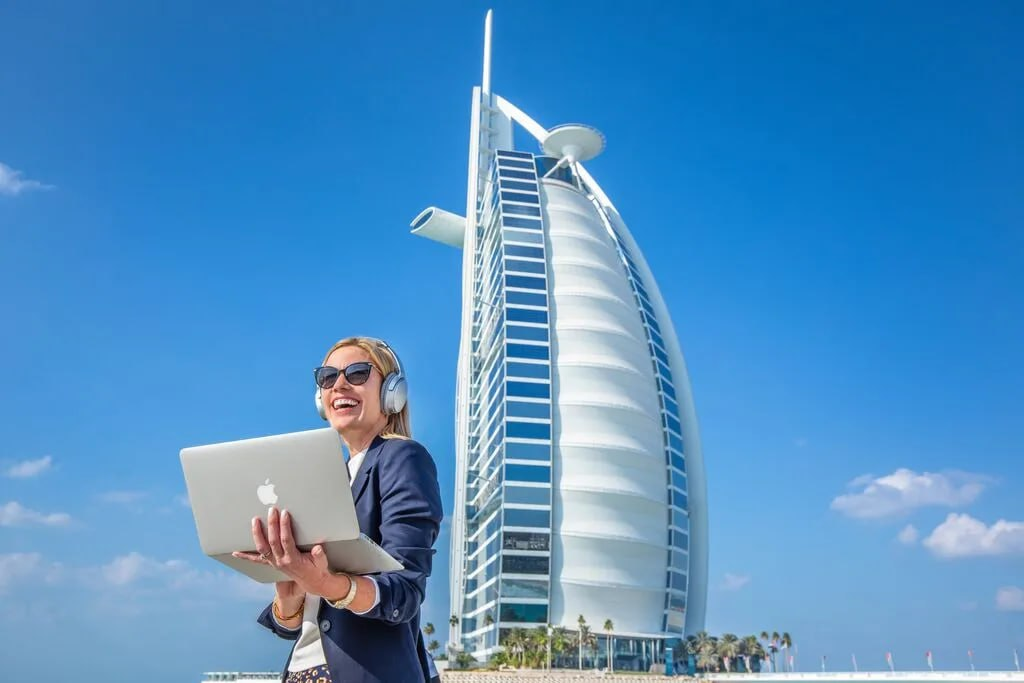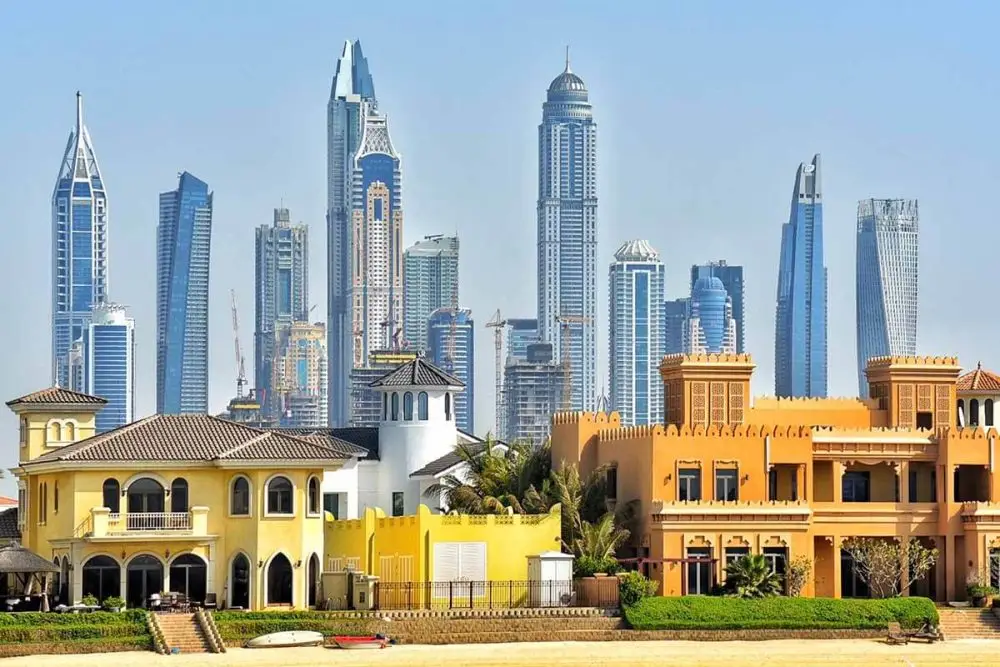The Emirates is no longer associated only with luxury holidays and skyscrapers. The country is impressing with its pace of development and large-scale projects, rapidly establishing itself as one of the world’s most dynamic business hubs. The unique combination of high living comfort, efficient infrastructure and ambitious government policy creates an exceptional environment for entrepreneurs. What exactly are the practical advantages of starting and developing a business in the UAE that make it so attractive? Let’s understand the specific advantages of the jurisdiction.
Dubai: a business oasis in the desert
A city where skyscrapers compete for attention not with nature, but with investment portfolios. The pros of doing business in the Emirates take on density right here.
Dubai provides:
- instant access to markets in Asia, Europe, Africa;
- developed logistics through Jebel Ali, the largest port in the Middle East;
- business infrastructure network: from co-working centres to technology incubators.
Business in Dubai is not limited to luxury – it lives in concrete terms. Export-oriented companies here earn an average of 17 per cent more than in comparable regions, thanks to low costs and the absence of hidden taxes.
Whether to open a business in the UAE: pros and cons
 The cost of mistakes in choosing a jurisdiction directly affects the viability of a company. In the Emirates, businesses do not make promises, but concrete processes – fast, regulated and result-oriented. Here, comfort is not promised – it is created normatively. Business in the UAE demonstrates its advantages through real mechanisms, not theoretical conveniences:
The cost of mistakes in choosing a jurisdiction directly affects the viability of a company. In the Emirates, businesses do not make promises, but concrete processes – fast, regulated and result-oriented. Here, comfort is not promised – it is created normatively. Business in the UAE demonstrates its advantages through real mechanisms, not theoretical conveniences:
- Startup speed. Free Zone FZ-LLC form is registered in 48 hours. Licence – another 24 hours.
- Transparent tax environment. No income tax up to 375,000 AED (≈100,000 USD), 9% rate – above this amount.
- Flexibility of Free Zones. More than 45 free economic zones allow you to choose the conditions by type of activity, visa quota, access to foreign markets.
Example: the DMCC is an area that serves over 22,000 companies specialising in trading, technology, cryptocurrency. This is where 200+ new businesses are registered per month.
Minuses of doing business in the UAE
Behind the facade of tax incentives and business forums are details that are easy to miss. The mistaken perception of the Emirates as a universal comfort zone quickly collides with reality. Entrepreneurship in the Emirates is affirming, but only if you are prepared to consider the other side of the coin.

The minuses of business in the UAE affect:
- high cost of business (opening a company in DMCC – from 11,000 USD);
- The need to consider the culture of negotiation, especially in B2B (high context, preference for personal contacts);
- difficult adaptation to the climate – in summer temperatures reach 50°C, which increases energy costs and reduces the effectiveness of outdoor advertising.
The conditions are not critical, but require adaptation and calculation. Ignoring these factors increases risks and inhibits development, especially in the first 12 months of launch.
Visa, staff and communications
UAE visa for a business owner is issued for up to 10 years (Golden Visa). Personnel require separate sponsorship and quotas. Managing a team requires precise calculation – mistakes are costly.
Employees from the Philippines, India, Egypt and Lebanon form the core of recruitment. The average salary of an office specialist – from 2500 AED (≈680 USD), manager – from 10 000 AED.
The language of communication is English. Arabic is symbolic, important in legal documents and negotiations with government agencies.
Marketing and profit without illusions
Without advertising, commercial projects in the Emirates are sinking in the golden sand. In a highly competitive environment, the one who invests in digital wins.
Advertising in Google and Meta gives up to 6x ROI if properly adjusted to local specifics. For the offline segment, billboards in areas with a high density of expats are effective.
Business profits in property, logistics and e-commerce can reach 25-40% per annum, especially when entering the Saudi and Qatari markets through exports to the United Arab Emirates.
Exports to UAE
The pros of doing business in the UAE are enhanced by the export factor. Demand for quality products, technology and services continues to grow.
Exports to the UAE are showing momentum, with foreign trade exceeding AED 1.1 trillion in 2023. The main destinations are food products, construction materials, IT solutions and pharmaceuticals.
Entering the GCC market opens the door for exporters to the GCC, a region with a total GDP of over $2 trillion. Registering a company within the country facilitates certification of goods and participation in tenders.
Market and revenue: what a growth strategy works with
The pros of business in the UAE are revealed through income and flexibility. The average income of small companies in logistics is 1.2-1.5 million AED per year, and in retail – 800,000 AED.

The market is not oversaturated but requires adaptation to local preferences. Template import of ideas does not work – adaptation wins here.
Survival formula: localised product + digital strategy + good PR packaging. Case: a cosmetics brand from South Korea entered the UAE market in 2022, increasing sales by 300% through a TikTok campaign and collaboration with local Influencers.
Evaluate the pros of doing business in UAE and make a decision!
 As our review shows, the Emirates offers significant advantages for entrepreneurs: fast company registration in free zones (e.g. FZ-LLC in a matter of days), a transparent tax environment with a threshold for zero corporate tax rate (up to ~100,000 USD), and Dubai’s strategic position with access to markets in Asia, Europe and Africa, backed by excellent logistics via Jebel Ali port. Opportunities for growth through exports to GCC countries and high profit potential in sought-after niches such as logistics, real estate or e-commerce are real here, especially with a sound digital marketing strategy.
As our review shows, the Emirates offers significant advantages for entrepreneurs: fast company registration in free zones (e.g. FZ-LLC in a matter of days), a transparent tax environment with a threshold for zero corporate tax rate (up to ~100,000 USD), and Dubai’s strategic position with access to markets in Asia, Europe and Africa, backed by excellent logistics via Jebel Ali port. Opportunities for growth through exports to GCC countries and high profit potential in sought-after niches such as logistics, real estate or e-commerce are real here, especially with a sound digital marketing strategy.
However, it is important to approach the decision without illusions. Consider significant start-up costs (opening a company in popular areas like DMCC requires significant investment), high competition requiring product customisation and sophisticated marketing, and the need to understand local business practices and adapt to climatic conditions that affect operating costs.
 en
en  de
de  ar
ar  es
es  hi
hi  fr
fr  nl
nl  it
it  pt
pt  el
el 









